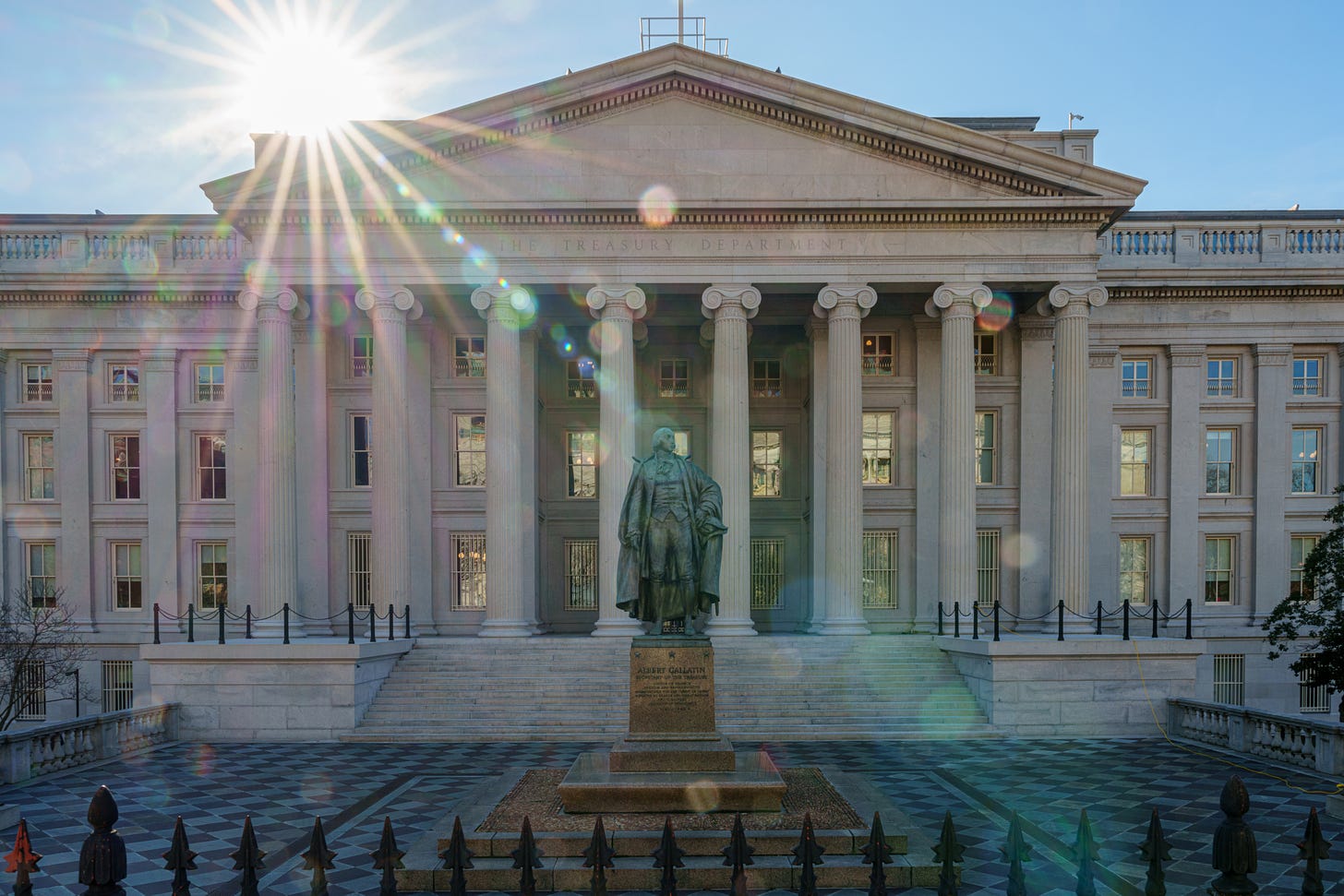
For Better Sanctions Enforcement, Look to Banks
Governments must make it easier for financial institutions to catch evaders.

ON JUNE 12, THE TREASURY DEPARTMENT announced new sanctions on entities assisting Russia in obtaining military goods for its war against Ukraine. These “secondary sanctions,” which expand the scope of financial restrictions beyond Russia itself to individuals, groups, and organizations in other countries that help Russia overcome “primary sanctions,” will complicate Russia’s ability to finance its war in Ukraine. But sanctions on paper aren’t enough—their enforcement matters at least as much as the letter of the law, because sanctioned countries are becoming increasingly savvy at evading Americans and Western restrictions.
Imex-Expert, a Belarusian logistics company, markets itself as capable of providing “solutions for the supply of goods bypassing sanctions by road and rail” on its website. That’s just one example of a larger problem: 95 percent of the parts in Russian weapons are manufactured with products from countries that have implemented sanctions on Russia. China is also becoming craftier at skirting trade constraints levied by democracies.
While the specific restrictions imposed on Russia, China, and other countries may differ, their methods for circumventing these measures are remarkably similar. They often resort to a combination of third-party countries, shell and offshore companies, and manipulation of documentation to conceal true company ownership. As long as the United States and its allies and partners don’t devote adequate resources to tracing the cash flows through intermediaries and investigating fraudulent businesses, sanctions like the ones recently announced by the Treasury are mere words.
One of the key challenges in enforcing sanctions and export controls is the division of responsibilities. While governments formulate policies and designate sanctioned entities (individuals, companies, government bureaucracies, etc.), execution largely falls on the private sector, especially financial institutions. But unnecessary roadblocks limit how helpful the financial sector can be.
Financial institutions—with their expertise in research, due diligence, risk management, and accounting—have emerged as the frontline defense against sanctions evasion. While there is a limited degree of bartering between sanctioned countries, most sanctioned goods come from sanctioned countries, and most exchanges of sanctioned goods involve money. In fact, most sanctioned goods are bought in the countries issuing the sanctions using the financial system.
The USA Patriot Act of 2001 enlists domestic financial institutions in the fight against corrupt foreign financial institutions by requiring “special measures” against the target, ranging from additional due diligence and information collection to outright prohibition on interactions. (Domestic financial institutions, wary of being caught on the wrong side of the law, are often so zealous to obey the Treasury that they over-enforce sanctions.)
However, several legal and organizational shortcomings prevent banks and other institutions from being as effective as they could be. Banks and law enforcement agencies often lack a mutual understanding of what information is most helpful in catching sanctions evaders. As a result, the information they share, rather than being tailored and helpful, is often a giant, unwieldy data dump, which can hinder investigations rather than assisting them. When investigations cross domestic jurisdictions, as they so often do, legal hurdles are added to the organizational hurdles, further slowing enforcement.
The challenges multiply when investigations cross international borders. Countries are often reluctant to share information with one another, and in many cases they have information protection laws that make it impossible. There are organizations that help, like the Russian Elites, Proxies, and Oligarchs (REPO) Task Force and the Egmont Group, which facilitates financial information sharing, but the solutions still lag behind the problem.
To become more efficient, the United States and its allies should create a common database shared by financial institutions, import-export companies, and REPO officials. In a promising step toward smoother information sharing, the United States and United Kingdom recently announced a “data bridge” to allow information to cross between the countries more easily. Now all they need is a dedicated mechanism for identifying sanctions invaders and sharing that information among the relevant law enforcement and financial institutions.
Domestically, financial institutions need help in determining the most useful information for government investigations. Section 6201 of the Anti-Money Laundering Act of 2020 aims to create transparency between law enforcement agencies and the Treasury Department in determining which bank-collected data is most valuable. Yet this effort requires more momentum.
By prioritizing Section 6201, law enforcement agencies could streamline the information collection process for financial institutions. The Commerce Department should also be involved because it oversees export controls. Problems that have clear policy solutions are rare; problems for which the ameliorating policy has already become law are even rarer. Now all that remains is for the government to implement the policy, which, after three years, it should be able to do with confidence and speed.
Financial institutions, for their part, should update their requirements for document collection to include information on the import-export companies involved in sanctioned goods. Such reporting requirements would give the finance sector more insight into suspicious activity that might signal sanctions and export control evasion. This would require financial institutions directly involved in trade financing to learn to recognize more of the risks and red flags associated with evasion. The Federal Financial Institutions Examination Council should lead this type of training.
Of course, the United States shouldn’t and won’t be alone in clamping down on sanctions evaders. As the world’s largest economy and the major hub of the international financial system, the United States can lead its allies in partners, while also learning from their efforts to enforce their own sanctions more effectively.
Ultimately, the advantages of stricter sanctions enforcement through closer coordination between the government and the financial sector are three-fold. The first is that national security will be strengthened as American and allies economic power becomes less a theoretical concept backed up by threats and more an actual ability to shape global trade. The second is that increased due diligence and data collection can help law enforcement against not only national security threats but also various kinds of international crime. The last, but arguably the most important, is that it strengthens the rule of law against abuse by sanctions targets and evaders who take advantage of the liberal trade system to undermine it.
















